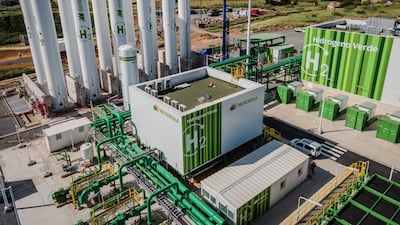Deals in the hydrogen sector gathered pace on the sidelines of the Cop28 climate conference in Dubai as companies raced to boost the production of the fuel, seen as key to reducing emissions in sectors such as shipping and steel manufacturing.
Several companies announced plans to set up hydrogen projects or boost the international trade of low-carbon fuel as industries worldwide look to reduce their reliance on fossil fuels.
Most of the announcements have been centred around the UAE and the Middle East and North Africa region, which has the potential to be a global hydrogen hub, Javier Cavada, president and chief executive of Mitsubishi Power Emea, told The National.
“We can see the Emirates [and] Saudi Arabia positioning themselves. They are looking at … renewables production and [the] hydrogen value chain,” he said.
That includes the production and export of hydrogen as well as blending the fuel with other elements, he added.
Early on at Cop28, Abu Dhabi’s clean energy company Masdar and Spain’s Iberdrola signed a €15 billion ($16.35 billion) partnership to evaluate the development of offshore wind and green hydrogen projects in key markets including Germany, the UK and the US.
Masdar also signed an initial agreement with Austrian energy company OMV to explore the production of green hydrogen for the decarbonisation of industrial processes in OMV’s refineries.
On Thursday, Masdar and hydrogen fund manager Hy24 announced the signing of a development and investment framework agreement to foster large-scale green hydrogen projects.
The companies will focus on projects in key regional hubs across Europe, the Americas, Asia Pacific and the Mena region.
Meanwhile, Adnoc, which aims to achieve net-zero emissions by 2045, teamed up with Japan’s Mitsubishi Heavy Industries, the parent company of Mitsubishi Power, to explore potential opportunities in green hydrogen and ammonia value chains.
Hydrogen, which can be produced using both renewable energy and natural gas, is expected to be a critical fuel of the future, particularly in hard-to-abate sectors.
Its ability to efficiently store energy makes it appealing for renewable energy sources such as wind and solar, both of which are naturally intermittent.
“Hydrogen is ticking all the boxes,” Mr Cavada said.
The Mena region has the infrastructure and engineering capabilities as well as the “most developed” supply chain on the planet, he said.
French investment bank Natixis estimates investment in hydrogen will exceed $300 billion by 2030.
In a June report, the International Energy Agency said Oman was on track to become one of the largest producers of hydrogen in the world by 2030.
The country has the benefit of ample renewable energy sources and vast tracts of available land, the agency said.
Meanwhile, the UAE, the Arab world’s second-largest economy, aims to achieve hydrogen production of 1.4 million tonnes annually by 2031 and plans to increase output to 15 million tonnes a year by 2050.
The country is planning to develop at least two hydrogen production hubs, or oases, by 2031.
More than 70 per cent of the country’s hydrogen production will be green, Suhail Al Mazrouei, Minister of Energy and Infrastructure, said at the UN summit.
“Hydrogen for us in the UAE is definitely one of the solutions … we will help other nations as well in exporting hydrogen, primarily green hydrogen,” he said.
At Cop28, more than 30 countries, representing about 80 per cent of the future global market in hydrogen, signed a declaration of intent, under which, states agreed to endorse a global certification standard for hydrogen and to recognise existing certification schemes.
The countries also signed a public-private action statement on hydrogen, which will focus on accelerating permissions for hydrogen projects and creating more demand for the commodity.
For hydrogen projects to be financially viable is not “easy” due to the absence of a trading mechanism, Mr Cavada said.
After being produced, a certification system enables end users and governments to determine the source and quality of the hydrogen.
However, current certification systems are not suitable for cross-border trade due to gaps in design, standards, and labelling, leading to insufficient information.
Hydrogen plans
Earlier this month, India's ReNew, a subsidiary of New York-listed ReNew Energy Global, said it was exploring green hydrogen projects in markets such as Egypt as part of diversifying its operations internationally.
The company, which is backed by investors including the Canada Pension Plan Investment Board and the Abu Dhabi Investment Authority, plans to develop most of its green hydrogen projects in India, ReNew’s chief executive Sumant Sinha told The National.
Meanwhile, Sharjah National Oil Corporation, the emirate’s sole gas supplier, is exploring green hydrogen and carbon capture projects amid efforts to reach net-zero emissions by 2032, Hatem Al Mosa, its chief executive told The National last week.










